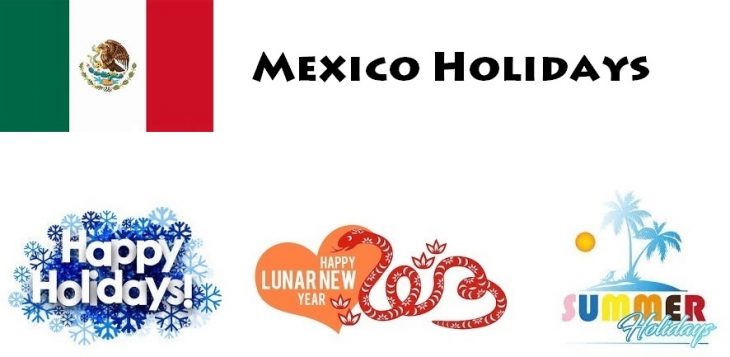Mexico Holidays
Mexico Public Holidays
Searching for the national holidays in Mexico? All public holidays in Mexico are treated like Sundays. This means that most of the Mexico employees have a day off and all schools are closed on these office holidays. If you are planning a trip to Mexico and want to know what the national and regional holidays are, check the details in the tables below.
List of Official Holidays in Mexico for Year 2020
| # | Date | Holiday | Day |
| 1 | January 01, 2020 | New Year’s Day | Wednesday |
| 2 | February 03, 2020 | Constitution Day | Monday |
| 3 | March 16, 2020 | Benito Juarez’s Birthday | Monday |
| 4 | April 09, 2020 | Maundy Thursday | Thursday |
| 5 | April 10, 2020 | Good Friday | Friday |
| 6 | May 01, 2020 | Labor Day | Friday |
| 7 | May 05, 2020 | Cinco de Mayo | Tuesday |
| 8 | May 10, 2020 | Mother’s Day | Sunday |
| 9 | June 21, 2020 | Father’s Day | Sunday |
| 10 | September 16, 2020 | Independence Day | Wednesday |
| 11 | October 12, 2020 | Mexico Day of the Races | Monday |
| 12 | November 02, 2020 | Day of the Dead | Monday |
| 13 | November 16, 2020 | Revolution Day | Monday |
| 14 | December 12, 2020 | Day of the Virgin of Guadalupe | Saturday |
| 15 | December 25, 2020 | Christmas Day | Friday |
List of Official Holidays in Mexico for Year 2021
| # | Date | Holiday | Day |
| 1 | January 01, 2021 | New Year’s Day | Friday |
| 2 | February 03, 2021 | Constitution Day | Wednesday |
| 3 | March 15, 2021 | Benito Juarez’s Birthday | Monday |
| 4 | April 01, 2021 | Maundy Thursday | Thursday |
| 5 | April 02, 2021 | Good Friday | Friday |
| 6 | May 01, 2021 | Labor Day | Saturday |
| 7 | May 05, 2021 | Cinco de Mayo | Wednesday |
| 8 | May 10, 2021 | Mother’s Day | Monday |
| 9 | June 20, 2021 | Father’s Day | Sunday |
| 10 | September 16, 2021 | Independence Day | Thursday |
| 11 | October 12, 2021 | Mexico Day of the Races | Tuesday |
| 12 | November 02, 2021 | Day of the Dead | Tuesday |
| 13 | November 16, 2021 | Revolution Day | Tuesday |
| 14 | December 12, 2021 | Day of the Virgin of Guadalupe | Sunday |
| 15 | December 25, 2021 | Christmas Day | Saturday |















































